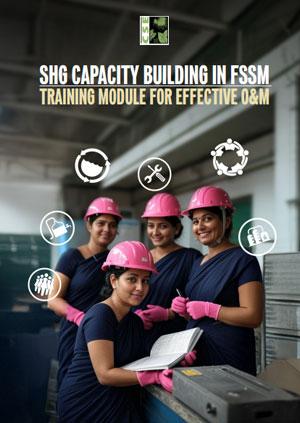SHG Capacity Building in FSSM- Training Module for Effective O&M
September 01, 2025
As part of a pioneering gender inclusion effort, launched at central level the AMRUT Mitra initiative in 2024 under the collaboration of AMRUT 2.0 and DAY-NULM, focusing on engaging Self-Help Groups (SHGs) in urban water and sanitation infrastructure. The initiative, theme being as “Women for Water, Water for Women”, was formally introduced by the Ministry of Housing and Urban Affairs on February 7, 2024.
Under this initiative, four cities—Sitapur, Khurja, Raebareli, and Jaunpur—were selected to pilot SHG-led operations and maintenance (O&M) of Faecal Sludge Treatment Plants (FSTPs). The state executed 87 projects under the broader AMRUT Mitra initiative, engaging a total of 804 women, out of which 16 women were specifically trained and enrolled for direct Operation and Maintenance responsibilities at FSTPs. Each city’s model includes a Supervisor, two Sanitation Workers, and one Gardener, forming a four women operational team in every city. A dedicated budget of Rs 34 lakh was allocated solely for SHG engagement in FSTPs.
The Centre for Science and Environment (CSE) has served as the Technical Support Unit (TSU) for this pilot since its inception in March 2024, playing a pivotal role in facilitating effective SHG involvement. CSE contributed significantly at both the planning and implementation stages.
Drawing on insights gained during field-level trainings with Self-Help Groups (SHGs), the Centre for Science and Environment (CSE) developed a comprehensive three-day training module tailored for trainers aiming to instruct SHG membersand plant operators alike. This module holistically covers the essential elements of faecal sludge treatment plant operations and maintenance, and is designed to be both technically robust and engaging.
Key features of the training module include:
- In-depth sessions on treatment chains and operational workflows.
- Hands-on demonstrations through practical exercises and plant visits to build familiarity with real-time operations.
- Case studies showcasing approaches and lessons learned from other states like Odisha.
- Interactive elements such as ice-breaker activities and energizers to enhance engagement and collaborative learning.
- A built-in daily feedback mechanism to assess trainee understanding and improve session delivery on an ongoing basis.
The module equips trainers with structured content, participatory tools, and contextual examples that support a replicable training ecosystem—ensuring plant operators across cities are prepared for the operational, safety, and maintenance challenges of treatment plants.

Share this article